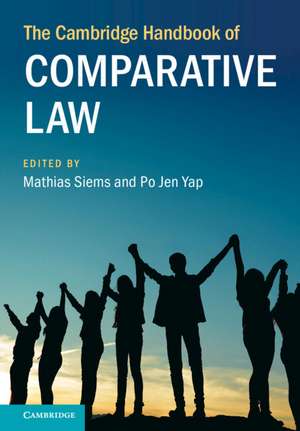The Cambridge Handbook of Comparative Law: Cambridge Law Handbooks
Editat de Mathias Siems, Po Jen Yapen Limba Engleză Hardback – 30 ian 2024
Din seria Cambridge Law Handbooks
- 14%
 Preț: 1082.13 lei
Preț: 1082.13 lei - 23%
 Preț: 1305.60 lei
Preț: 1305.60 lei -
 Preț: 281.74 lei
Preț: 281.74 lei -
 Preț: 299.93 lei
Preț: 299.93 lei -
 Preț: 304.01 lei
Preț: 304.01 lei - 23%
 Preț: 1141.69 lei
Preț: 1141.69 lei -
 Preț: 232.94 lei
Preț: 232.94 lei -
 Preț: 215.26 lei
Preț: 215.26 lei - 20%
 Preț: 198.47 lei
Preț: 198.47 lei - 14%
 Preț: 1285.59 lei
Preț: 1285.59 lei - 23%
 Preț: 1051.30 lei
Preț: 1051.30 lei - 23%
 Preț: 1139.30 lei
Preț: 1139.30 lei - 23%
 Preț: 1162.90 lei
Preț: 1162.90 lei -
 Preț: 317.77 lei
Preț: 317.77 lei - 23%
 Preț: 1109.50 lei
Preț: 1109.50 lei - 23%
 Preț: 1177.27 lei
Preț: 1177.27 lei - 20%
 Preț: 1216.58 lei
Preț: 1216.58 lei - 23%
 Preț: 1062.18 lei
Preț: 1062.18 lei -
 Preț: 331.33 lei
Preț: 331.33 lei - 23%
 Preț: 860.96 lei
Preț: 860.96 lei -
 Preț: 468.73 lei
Preț: 468.73 lei - 14%
 Preț: 873.14 lei
Preț: 873.14 lei -
 Preț: 357.37 lei
Preț: 357.37 lei - 23%
 Preț: 1221.80 lei
Preț: 1221.80 lei -
 Preț: 305.05 lei
Preț: 305.05 lei - 23%
 Preț: 1296.11 lei
Preț: 1296.11 lei - 23%
 Preț: 1365.80 lei
Preț: 1365.80 lei - 23%
 Preț: 1403.54 lei
Preț: 1403.54 lei - 23%
 Preț: 1097.31 lei
Preț: 1097.31 lei - 23%
 Preț: 1111.56 lei
Preț: 1111.56 lei -
 Preț: 534.56 lei
Preț: 534.56 lei - 23%
 Preț: 1069.73 lei
Preț: 1069.73 lei - 23%
 Preț: 1248.43 lei
Preț: 1248.43 lei -
 Preț: 399.90 lei
Preț: 399.90 lei - 14%
 Preț: 872.75 lei
Preț: 872.75 lei -
 Preț: 308.62 lei
Preț: 308.62 lei -
 Preț: 393.60 lei
Preț: 393.60 lei -
 Preț: 442.21 lei
Preț: 442.21 lei - 23%
 Preț: 1133.10 lei
Preț: 1133.10 lei
Preț: 1188.37 lei
Preț vechi: 1543.34 lei
-23% Nou
Puncte Express: 1783
Preț estimativ în valută:
227.47€ • 247.16$ • 191.20£
227.47€ • 247.16$ • 191.20£
Carte tipărită la comandă
Livrare economică 21 aprilie-05 mai
Preluare comenzi: 021 569.72.76
Specificații
ISBN-13: 9781108843089
ISBN-10: 1108843085
Pagini: 712
Ilustrații: 19 b/w illus. 11 tables
Dimensiuni: 263 x 186 x 49 mm
Greutate: 1.56 kg
Editura: Cambridge University Press
Colecția Cambridge University Press
Seria Cambridge Law Handbooks
Locul publicării:Cambridge, United Kingdom
ISBN-10: 1108843085
Pagini: 712
Ilustrații: 19 b/w illus. 11 tables
Dimensiuni: 263 x 186 x 49 mm
Greutate: 1.56 kg
Editura: Cambridge University Press
Colecția Cambridge University Press
Seria Cambridge Law Handbooks
Locul publicării:Cambridge, United Kingdom
Cuprins
1. Introduction: a new handbook for comparative law in a global context Mathias Siems and Po Jen Yap; Part I. Methods of Comparative Law: 2. Traditional methods Jaakko Husa; 3. Historical-jurisprudential methods Jean-Louis Halpérin; 4. Critical methods Thomas Coendet; 5. Culture and comparative law methodology Qian Xiangyang; 6. Linguistic approaches Łucja Biel; 7. Qualitative fieldwork Petra Mahy, Richard Mitchell, John Howe, Ingrid Landau and Carolyn Sutherland; 8. New institutional economics Olive Sabiiti; 9. Empirical methods Mathias Siems; 10. Machine-learning methods Han-wei Ho, Patrick Chung-Chia Huang and Yun-chien Chang; Part II. Legal Families and Geographical Comparisons: 11. Civil law Andrea Ortolani; 12. Common law Shivprasad Swaminathan; 13. Confucian legal tradition Ngoc Son Bui; 14.Former Soviet States of Eastern Europe, Caucasus and Central Asia Andrey Shirvindt; 15. Latin America Isabel Zuloaga and José Manuel Díaz de Valdés; 16. Middle East and North Africa Radwa Elsaman; 17. South Asia Rehan Abeyratne; 18. Sub-Saharan Africa Charles Manga Fombad; Part III. Central Themes in Comparative Law: 19. The tradition of comparative law: comparison and its colonial legacies Helge Dedek; 20. Decolonial theory and comparative law Roger Merino; 21. Legal transplants: a theoretical framework and a case study from public law Margit Cohn; 22. Legal transplants: a case study of private law in its historical context Gerardo Caffera, Rodrigo Momberg and María Elisa Morales; 23. Convergence and divergence in public law Po Jen Yap; 24. Convergence and divergence in company law Hatice Kübra Kandemir; 25. Law and development Yong-Shik Lee and Andrew Harding; 26. Divided legal systems: understanding legal systems in conflict-prone societies M. Bashir Mobasher and Haroun Rahimi; 27. Legal pluralism and commerce Ada Ordor, Nojeem Amodu and Victor Amadi; Part IV. Comparative Law Beyond the State: 28. Comparative international law Danielle Hanna Rached and Conrado Hubner Mendes; 29. Transnational regulation Victor V. Ramraj; 30. Quantitative forms of legal governance Rene Urueña; 31. Comparative international arbitration law Shahla Ali; 32. Cross-border judicial dialogue Tom Gerald Daly; 33. Comparing regional law Armin Cuyvers; 34. Comparative conflict of laws Yuko Nishitani; 35. Comparative indigenous law Anthony C. Diala; 36. Comparative legal education Tan Cheng-Han, Alan Koh, Topo Santoso, Umakanth Varottil and Jiangyu Wang.
Descriere
Presents a truly global perspective of comparative law today aiming to appeal to readers globally.
